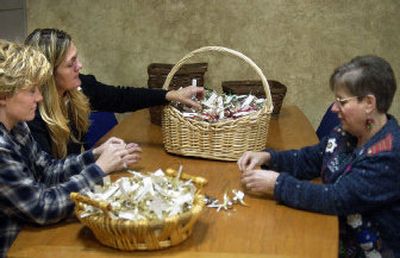Houses of God

When the Rev. Kurt Bubna says he grew up in a “very traditional church,” he’s not talking about faith – he’s talking about the architecture. But Bubna is now in a very different kind of church. Last year the pastor’s flock, Eastpoint Church, found a home inside an old Kmart building at Sprague Avenue and Sullivan Road in Spokane Valley. For $300,000 the retail building was transformed into a church, complete with a lobby, resource center and coffee shop, sanctuary with seating for 550, children’s area, prayer room, youth center and offices.
“We’re not your grandmother’s church, and we don’t try to be,” he said. “People come out and say, ‘It looks like a Starbucks in here,’ “
Other young and growing congregations in the Spokane area also are choosing modern heating and air conditioning, plentiful parking and cheap leases instead of gothic stones and wooden steeples. Commercial properties, like old theaters, big-box stores and strip mall locations, have increasingly become today’s hip house of God.
When the congregation of Manito Presbyterian Church split in 2001, the departing church members formed Southside Christian Church and moved into the former Lincoln Heights Cinemas.
George Comstock, executive pastor for Southside, said the church has flourished since converting the theater. It has since expanded into adjacent buildings to create family and youth centers. The main worship room seats 380 and other theaters have been reappointed for other functions.
“The seats were all the original seats. We just had to build a platform to hold services on. It’s all very functional,” he said. “This location is tremendous.”
Bubna said his storefront church also reflects a more relaxed attitude that attracts others to the church.
On any given weekend, Bubna estimates, Eastpoint serves about 900 worshippers spread over several services throughout the day. Jeans are acceptable worship wear at Eastpoint and picking up a latte in the lobby is par for the course.
The emphasis on convenience and comfort is not radical, Bubna said.
“For those who want traditional, they have their place and we have ours. It doesn’t mean we don’t approve of what they do,” he said.
Comstock echoed these sentiments. Sometimes the traditional architecture of a church building can be intimidating, he said.
“It’s made it more accessible for people who had a negative experience at a traditional church, and it makes it even more accessible to people who haven’t had any experience at all,” he said.
Eastpoint, for example, is just one part of a family of successful local churches spawned by Life Center, which has started two other Spokane congregations in commercial locations, including Lifepoint in the former Eastside Cinema and Life Center North in the former Lyons Cinemas. Commercial buildings also have financial advantages for churches. They are readily available and inexpensive. Modifying an existing building is much cheaper then starting from scratch.
Moving into the old Kmart location meant 30,000 square feet of open, undivided space and 440 parking spaces on one of the busiest corners in Spokane Valley, Bubna said.
“That’s a phenomenal location,” he said. “To build this from scratch would have cost us millions.”
Even though leasing the theater was an excellent bargain, Comstock said his church was initially skeptical.
“We had no land, we wanted to stay on the South Hill and we were drawn (to the theater) even though, at first, it didn’t seem like a church would work here,” he said.
But the theater could be converted by volunteers, drastically cutting costs.
“We had a lot of what we called ‘sweat equity’ done by the members,” Comstock said. “We probably saved about $60,000 in labor cost.”
Comstock said the church also has been good for the community.
“We really wanted to reinvest back into the community. There’s a lot of empty property along Sprague, and we wanted to fill some of it,” Bubna said.